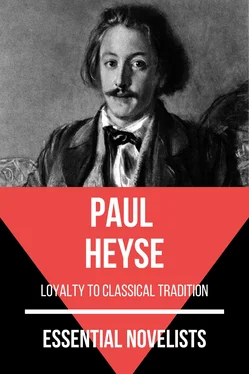––––––––

MEANTIME LORINSER HAD only crept down one flight of stairs and stopped before the door on the second story. He read the name on the small sign, listened a few minutes, and then gently pulled the bell.
Christiane opened the door and gazed in surprise at the stranger, whom she had just seen with Edwin. His penetrating gaze rested on her a moment, then he raised his eyes toward the ceiling of the entry, as if solely interested in the spiders' webs.
"Fräulein Christiane Falk?" said he.
She made an almost imperceptible bow. "What do you want, sir?"
"Will you allow me to come in a moment, the errand that brings me to you can hardly be discussed here—"
She drew back a step from the threshold to admit him. In an instant he had crossed the ante-room and entered the half sitting room half bedroom, to which we were introduced the night that this story opened. Its appearance in the broad daylight was not much more cheerful, than by the feeble rays of the little lamp. The walls were hung with faded tapestry, but destitute of pictures. The floor was uncarpeted, there were no flowers, none of the hundred trifles with which lonely women adorn their rooms and endeavor to supply the lack of human companionship; nothing but a quantity of books on the bureau, the volume of Schopenhauer on the table before the sofa, and numerous sheets of music scattered in disorder over the piano. The whole produced the impression that there were no bright eyes here, to whom life was pleasant for the sake of its charms.
The face of the occupant only too plainly confirmed the testimony of the mute objects around her.
The features were unlovely, harsh, and no longer youthful, the brows almost met over the light grey eyes, the hair, thick but not soft, hung over the pale brow like a heavy shadow. The only charm in this stern visage, the full mouth with its dazzlingly white teeth, had a decided approach to a mustache, and by its habitual expression of gloomy defiance seemed to contradict the idea that this face could ever wish to please. The same avoidance of all desire for comeliness was visible in the dress. But even the most clumsy folds could not wholly conceal the fact that the masculine head was placed on a most exquisite female figure.
She stood quietly by the table, opposite to Lorinser, who without waiting for her invitation, had thrown himself upon the little sofa and was scanning the apartment with his lightning like side glance. With a careless gesture of the hand he invited her to sit down beside him, but she remained standing motionless, with folded arms.
"Honored Fräulein," said he, "I have heard so much of your talent, my friend Doctor Edwin, your fellow lodger, has just confirmed it so warmly, that it seems to me like a direct interposition of Providence that I have now found my way to you. My business can be stated in two words. Some friends who were not satisfied with the public worship of the church, have for some time arranged a quiet service of their own, in which music occupies an important part. The lady who formerly played the harmonium, has gone away. There is no one among us who could take her place, so I undertook to provide a substitute. I thought of you, Fräulein. That you are no virtuoso of the common stamp, but a person to whom the mysterious nature of true, genuine music is revealed, I see by a single glance at that book, in which I read the names of Bach and Glück, and—allow me to speak frankly—one look into your eyes, which beam with a deeper radiance than those of ordinary women. Those eyes bear witness that your music is your religion. I will not conceal from you that this point of view does not yet seem to me the highest one. To me, music is only a stepping stone to divine happiness, though certainly one of the nearest to the throne of the Eternal. However, I am not here to preach to you. Besides, no one in our circle will annoy you by the supposition that you will share our devotions. But for what you give us, you will in every sense be richly rewarded. I only beg to tell you on what conditions—"
"And suppose I could not consent upon any condition?" she quietly interrupted.
He seized the book that lay on the table before him, turned the leaves without apparently taking any notice of their contents, and after a short pause replied:
"You will perhaps think differently, Fräulein, when I tell you that you need not attend these religious exercises in person. The instrument stands in a room, which is divided from the hall where we assemble by a tolerably large apartment. You will play as if to yourself, and not a whisper of what takes place in the little congregation outside, will reach your ears. In this way both you and we will be spared any mutual annoyance, and only share what is alike to all."
He looked at her with a keen, searching glance. She was gazing into vacancy, and seemed to be considering how far she should reveal her most secret feelings to this stranger. A bitter expression suddenly flitted over her lips, and her brows contracted.
"Pardon me," she said hastily, "if I must decline under any circumstances, to take part in what is called divine service. My reasons for so doing I may be permitted to keep to myself. I doubt whether they would be understood, far less appreciated by you, and I am not accustomed to be faithless to my convictions, even for the large fee you intimate I should receive."
"Your reasons?" he said smiling, as he rose and approached her. "Will you permit me to read these reasons, or rather this one motive from your brow?"
"Sir—"
She looked at him in astonishment and retreated a step, as if to protect her personal freedom. He stood still and again gazed steadily at the ceiling.
"The one reason that you will take no part in any religious service, is: that you have no God whom you desire to serve," he said in the frankest possible tone, as if he were speaking of something that was quite a matter of course.
She did not answer immediately. The man's amazing assurance seemed to intimidate her. She was forced to arm herself with her old defiance ere she could reply.
"Did you really read it from my brow, or only in the book on the table?"
"My dear Fräulein," he answered kindly, "if I had had the honor of a longer acquaintance with you, you would expect me to be able to solve so easy an enigma without such aid. The author of that book, believe me, with all his atheism, knew more of God than you do—at least at this time, for he knew that which alone leads to Him, and which so far as I see, has hitherto remained unknown to you, and therefore renders the natural estrangement from God you share with countless others, so harsh and apparently necessary: sin. You need not answer yes or no. I'm sure of it: whatever errors and weaknesses have entered your life, you have never known sin, that sin which alone arouses in the wilful heart the need, the longing for redemption, the burning sense of our own weakness and baseness, which makes us thirst for God and is at last stilled by the dew of mercy. Do you smile, Fräulein? This language seems to exaggerated to express the naked truth. Some day you will remember it, and no longer smile.
"No," he continued as if in sudden agitation, pacing up and down the room with hasty strides. "I will not give you up. I have felt too strongly attracted toward you, from the first words that fell from your lips, to be able to go away now and say to myself: this strong, beautiful soul will never find the way to the holy of holies. Even such a powerful guide as music will only lead you to the threshold. Believe me, my dear Fräulein, I too have had similar experiences; I too once said like you: the God who has created heaven and earth and myself, is too great for my love, too distant for my longing, too silent for my confidence. And why should I have desired to approach him? What did I lack, so long as I had myself, my virtue, my worldly pleasure, my good works? Not until the day when I first became familiar with sin, when I had lost myself, did I learn how near this far off being can come, how eloquently he can console, how lovingly he can draw you to himself. Since that time all the sorrows of the world, of which that bewildering book speaks, have seemed to me mere child's play in comparison to the misfortune of being sufficient to ourselves and attempting to fight our way through the unconquerable horrors of existence, by means of common place honesty, courage, and innocence, the trivial 'always practice truth and justice.'"
Читать дальше













